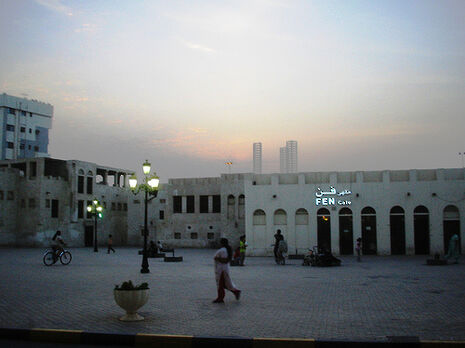Cambridge cultivating academic links with the Gulf
Academics from the University’s Centre of Islamic Studies have travelled to the United Arab Emirates for a research conference promoting ties between the countries

Members of Cambridge’s Centre of Islamic Studies have joined experts from the United Arab Emirates (UAE) in a two day research conference, which included the first public presentation of the “Narratives of Conversion to Islam in Britain: Female Perspectives” project. This symposium marks another milestone in Britain’s growing, yet ethically questioned, security, economic and intellectual ties with the UAE.
Academics have collaborated with the American University of Sharjar, based in the UAE, for a two-day research symposium, beginning 10 March. Over a dozen academics and PhD students have made the trip from the banks of the River Cam to the shores of the Arabian Gulf to witness, among numerous other research topics, the first public presentation of the ‘Narratives of Conversion to Islam in Britain: Female Perspectives’ project. This new research has been led by Professor Yasir Suleiman, the founding director of the University’s Prince Alwaleed Bin Talal Centre of Islamic Studies, in association with The New Muslims Project, Markfield.
With the recent rise of female converts to Islam in Britain, this project maps the various paths to faith and narrates the individual conversion stories of these women. Introducing the report, the Professor said “We have endeavoured to describe the experience of women converts to Islam in contemporary British society and the relationship between the convert, the Muslim communities and wider society is explored with reference to their political, social and religious contexts.”
This research will be a significant part of the wider conference which follows on from previous visits by the Centre of Islamic Studies to Sarajevo, Morocco and China, aimed at fostering new dialogues, partnerships and knowledge exchange beyond the boundaries of Cambridge.
Over 4000 British companies are currently active in the UAE and the influence of the UAE has been felt in turn in British economic life. Deputy Prime Minister of the UAE, Mansour bin Zayed Al Nahyan is one such example; his investment company acquired Manchester City football club in September 2008. The UAE, as Britain’s sixteenth largest export market, annually purchases over £4.7 billion worth of British exports. Its economic importance to Britain is tipped to rise – the Foreign Office has expressed its aim of increasing the value of bilateral trade to £12 billion by 2015.
Yet, the UAE’s autocratic monarchy has recently been criticised by Human Rights Watch for having “cracked down on peaceful dissent by arresting activists, disbanding elected boards of civil society organisations, and preventing peaceful demonstrations.” Its chronic discrimination against women before the law and continued cases of domestic violence have also been continuously flagged.
 Features / Meet the Cambridge students whose names live up to their degree9 September 2025
Features / Meet the Cambridge students whose names live up to their degree9 September 2025 News / Student group condemns Biomedical Campus for ‘endorsing pseudoscience’10 September 2025
News / Student group condemns Biomedical Campus for ‘endorsing pseudoscience’10 September 2025 News / Tompkins Table 2025: Trinity widens gap on Christ’s19 August 2025
News / Tompkins Table 2025: Trinity widens gap on Christ’s19 August 2025 News / New left-wing student society claims Corbyn support11 September 2025
News / New left-wing student society claims Corbyn support11 September 2025 Science / Who gets to stay cool in Cambridge?7 September 2025
Science / Who gets to stay cool in Cambridge?7 September 2025








